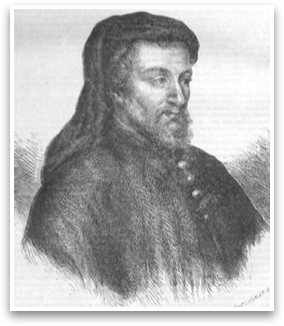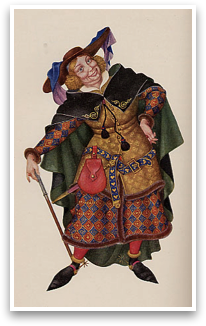
The Canterbury Tales and
the Wife of Bath's Tale Study Guide
Few writers have influenced the English language as have Geoffrey Chaucer. The son of a wine maker, Chaucer's choice to write the Canterbury Tales in English rather than Latin helped show that English could be taken seriously as a poetic language.
Though rightly renowned for the Canterbury Tales, Chaucer had already written world-class poetry by the time he penned the tales, in addition to his other works such as the translation of Boethetius' Consolation of Philosophy.
Along with Shakespeare and Milton, Chaucer is revered as one of the greatest poets in the English language.
One of Chaucer's favorite characters, without question, is the Wife of Bath (after all, her prologue is nearly three times longer than the tale itself). A saucy, lusty wench without peer, the five-times married Alisoun lives by her own code and her own rules.
Alas, just because she speaks passionately does not mean that she speaks authoritatively. As she makes unabashedly clear, her primary locus of authority is her experience, not the teachings of the church or of men. Of course, that doesn't stop her from attempting to wax eloquent on scripture.
Unfortunately, her attempts at hermeneutics (biblical interpretation) far fall short. Augustine might have said that her interpretive shortcomings are due to her still being trapped in sin, which he thought affected one's interpretive ability.
Alas, just because she speaks passionately does not mean that she speaks authoritatively. As she makes unabashedly clear, her primary locus of authority is her experience, not the teachings of the church or of men. Of course, that doesn't stop her from attempting to wax eloquent on scripture.
Unfortunately, her attempts at hermeneutics (biblical interpretation) far fall short. Augustine might have said that her interpretive shortcomings are due to her still being trapped in sin, which he thought affected one's interpretive ability.


Themes and Facts
- Chaucer's strength in the Canterbury Tales is matching the tale with the teller. For example, the knight treasures chivalric values, so his tale suits him perfectly.
- Chaucer withholds judgment of his characters. instead, his description allows the reader to judge appropriately.
- Often has ironic descriptions that are subtle criticisms of a particular office (e.g. the Prioress).
- Influenced by French and Italian intellectualism, particularly Dante, Petrarch, and Boccaccio.
Study Questions
- Which characters from the General Prologue make the biggest impression upon you? Why?
- What does Chaucer mean by “the wordes moote be cosyn to the dede”? How does this provide a baseline of evaluation for readers and pilgrims to follow?
- When Chaucer says we must excuse him for retelling the pilgrims’ tales in the same way they told them (in the same language) what is he saying about the relationships among language/character/truth?
- Chaucer often describes the pilgrims in the General Prologue as the best or the worthiest or the most honorable of their kind. Why does he do this? Are they all really the best?
- What do we learn about the Wife of Bath's abilities as a biblical interpreter? Take the time to find the original biblical texts that she references. Does she use them appropriately?
- Do people get what they deserve in her tale? Does it offend you? What is disturbing to our modern sensibilities about the tale?
- What is the signficance of the Wife of Bath's tale in light of Chaucer's obvious respect for the character of the knight who "loved chivalrie, trouthe and honour, fredom and curteisie"? Why would the wife be critical of chivalry? Of courtly love?
- Why is it significant that Chaucer has a female character tell a story where a knight falls short of the chivalric code, given the code's insistence on honoring the weak?
One of Chaucer's favorite characters, the Wife of Bath places her experience as the primary source of authority as opposed to the teachings of the church or of men.